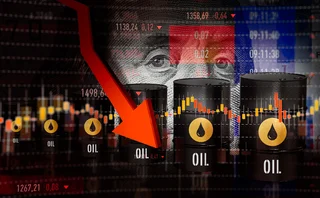Podcast: Kaminski and Ronn on negative oil and options pricing
The market is gravitating to the Bachelier model as an alternative to Black 76

In this, the first episode of a new series of Energy Risk podcasts, we explore the impact of negative oil prices on the world of options trading.
Vincent Kaminski, a professor at Rice University's Jones Graduate School of Business, and Ehud Ronn, a professor of finance at the McCombs School of Business at the University of Texas at Austin, dialed in to discuss the increased interest in the Bachelier model for options pricing.
On April 20, West Texas Intermediate oil futures at the CME turned negative for the first time ever, plunging as low as -$40 per barrel. While options prices remained positive, many traders began considering alternatives to the log normal Black (1976) options pricing model.
Like the Black-Scholes (1973) model for options on stocks and indexes, Black 76 – which is used to price options on futures, such as oil – does not accept negative prices. The Bachelier model does.
Models based on the formula Louis Bachelier published in 1900 already have traction in some energy markets, being used in electricity and natural gas where negative prices are more common. On April 22 this year, its profile was raised further when the CME switched out of Black 76 to the Bachelier model for pricing and margining oil options.
Kaminski and Ronn give a primer on the theory and practice of using Bachelier models to price oil options.
Index
01:35 Who was Bachelier, when did he develop his model and what was it intended for originally?
03:15 What are the Bachelier model’s key features?
07:26 How does it differ from Black 76?
09:02 What are the implications of using Bachelier on pricing and hedging derivatives?
10:51 How does the risk management of a derivatives portfolio change?
12:35 Are there any implications on margining?
14:30 Is the model easy to implement? Are market players equipped for the change?
16:24 Is Bachelier here to stay or is this just a temporary spike in interest that will die away as the spectre of negative oil prices falls away?
More on Oil & refined products
Energy Risk reaction: Venezuela and oil sanctions
Energy Risk talks to Rob McLeod at Hartree Partners about the energy risk implications of the US’s control of Venezuelan oil
Energy Risk Europe Leaders’ Network: geopolitical risk
Energy Risk’s European Leaders’ Network had its first meeting in November to discuss the risks posed to energy firms by recent geopolitical developments
US shutdown leaves commodity traders without key data
Commodity traders are ‘flying blind’ without Commitment of Traders reports
Energy Risk at 30: Learning from the past
Energy Risk looks back at the seminal events and developments that have shaped today’s energy markets
Why Iran tensions failed to rattle markets
Despite initial fears, traders say risks were signposted and investors had deleveraged after April
Oil and products house of the year: Macquarie Group
Energy Risk Awards: Bank pioneers innovative deals in illiquid markets, taking on esoteric risk
Podcast: should negative oil prices be allowed?
Did negative oil prices signify the market was operating effectively, or that something was wrong?
Podcast: the future of retail investment in oil
Will negative prices and big losses curb retail investors’ appetite for oil futures over the longer term?







